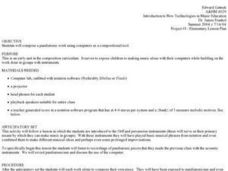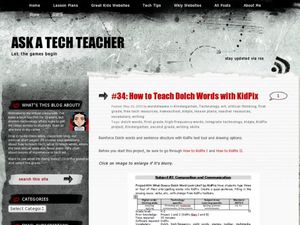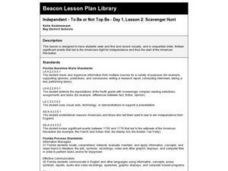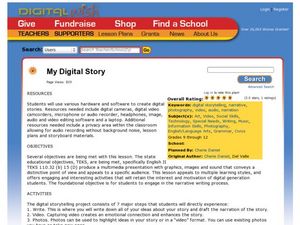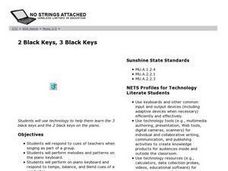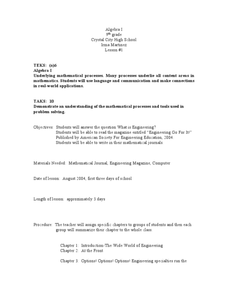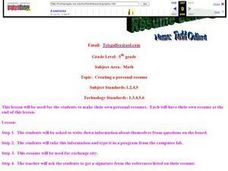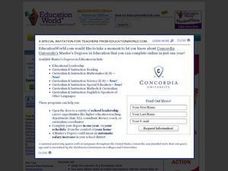Curated OER
Incorporating Japanese Music into the Music Classroom
Fourth graders experience the music and arts of Japan as they explore the language and culture of the country in this instructional activity. A variety of musical elements from the culture are demonstrated.
Curated OER
Composing Music on Computers
Young scholars compose pandiatonic works using computers as a compositional tool. Following the anticipatory set, they work individually to create their own pieces. The lesson concludes with a "concert" of the created student...
Curated OER
Indegenous Cultures Magazine in Publisher
Fourth graders use Publisher to create their own magazine. In this online magazine lesson, 4th graders follow the instructions to create a magazine using text, pictures, and colors within the Publisher system.
Curated OER
Tessellations in Excel
Pupils complete an Excel project on tessellations. In this technology and math lesson, students discuss tessellations and their occurrences in nature. Pupils use the Excel computer program to create tessellations.
Curated OER
How to Teach Dolch Words with Kid Pix
Learners use KidPix computer program to learn Dolch sight words. In this technology and language lesson, students type their Dolch sight words into KidPix to create a quasi-sentence.
Curated OER
Know Your Computer Hardware #103
Students discover the different terms and parts of a computer's body. In this computer basics lesson, students become familiar with the parts of the computer, starting in kindergarten and increasing their knowledge through...
Curated OER
Movement and Music: An Introduction to Slavery
Students create a slavery timeline. They identify key leaders in the anti-slavery movement. Students are asked what they can recall about slavery. They review the following vocabulary words slavery, spirituals, abolitionists, and...
Curated OER
What Does Sound Look Like?
Students work in small groups or individually to explore and edit an audio file. They identify beats and other features of waveform, find and remove silence in audio, experiment with fade and crossfade and export a clip they have completed.
Curated OER
Computer Olympics
Students compete to achieve excellence in math facts, writing terms, problem solving, and writing skills on the computer. In this Computer Olympics lesson plan, students practice the skill of drill and practice in order to succeed and...
Curated OER
Independent - To Be or Not Top Be - Day 1, Lesson 2: Scavenger Hunt
Fifth graders research the thirteen significant events that lead to the start of the American Revolution.
Curated OER
My Digital Story
Students write and direct digital stories to be presented to their classmates. In this digital stories lesson plan, students can use camcorders, microphones, headphones, storyboards, and more. Students edit their story and present it to...
Curated OER
When One Beat Is Better Than Two
Fourth graders create an individualized wellness plan that addresses these controllable health risk factors:obesity, high cholesterol level, high blood pressure and inactivity.
Curated OER
I Spy Poetry
Students identify and interpret the rhythm and form of the I Spy poem.
They then integrate art, music, literature, technology, and writing with poetry. Students also write their own poem based on the picture they printed from the I Spy...
Curated OER
First Rhythmic Composition
Students apply fractions to counting rhythm in music. In this algebra instructional activity, students interrelate the concept of math into music as they fill out a chart identifying the names and symbols of music notes and their...
Curated OER
2 Black Keys, 3 Black Keys
Students explore the black keys on the piano and basic music theory techniques using the Internet as a guide. Websites visited include www.PianoNanny.com and musictheory.net.
Curated OER
The Amazing Tomato
Students gain an understanding of where our food comes from. In this plant life lesson, students review what plants need for growth and how long it takes them to grow. Students research which plants it takes to make salsa. Students...
Curated OER
Problem Solving Using Math
Learners solve real life scenarios using algebra. In this word problem activity, students use different websites dealing with engineering as it relates to the real world and math. They use other resources such as magazines to solve word...
Curated OER
Welcome To Ella Fitzgerald: the Singer Not the Song
Students study the life and musical works of Ella Fitzgerald. They investigate how technology influences art using this series of web and video based lessons. They create their own melodies.
Curated OER
Creating a Personal Resume
Fifth graders be asked to write down information about themselves from questions on the board. They take this information and type it in a program from the computer lab. The resume will be kept in their expandable file for future reference.
Curated OER
Give My Regards to Broadway
Students investigate aspects of Broadway shows. They apply word attack skills to decide what the titles of actual Broadway shows mean. They discuss the history of Broadway shows and why they become successful before completing the...
Digital Forsyth
Old Salem Speech
The focus of the lesson plan is rhythmic speech and 4/4 time. The topic of the lesson plan is trades common in Old Salem during the colonial period. Learners will practice keeping time with their voices and body percussion. They will...
Curated OER
Background for The Outsiders: the 1960s
As background for a reading of S.E. Hinton’s The Outsiders, groups rotate through four stations (video, music, website, information) to gather information on the 1960s. In addition, they interview family members about the 1960s and...
Curated OER
Quel temps fait-il?
Hit all the basics with this lesson, focusing on weather, greetings, and dates! Start by singing a weather related song ("Quel temps fait-il by Barbara MacArthur is suggested), and then read a story about getting ready for school. The...
Curated OER
My Family and Our Nationality
After completing the activities included here, your beginning foreign language speakers will be able to name family members, identify a family's place of origin, and write short sentences about family members. They start by listening to...



